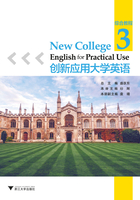
Part Six Translation
Compound Sentence II
复合句的翻译(二):宾语从句
宾语从句是名词性从句的一种,通常跟在动词和介词后面。翻译动词宾语从句时,通常按照其在句中的原来语序翻译,而介词宾语从句的翻译则应当根据语义需要,通常可以将从句的译文置于主句的译文前面。常用的翻译方法有以下几种。
1.由that, how, what等引导的动词宾语从句,一般情况下按原文语序翻译即可。例如:
1)A great deal of empirical evidence shows that pictures interfere with all aspects of learning to read.
大量的实证研究表明,图片会干涉阅读学习的各个方面。
2)They performed what jazz musicians call“head arrangements”.
他们表演的是爵士音乐家所说的“头脑编排”。
3)Researchers have found that in poor countries, being relatively well off does make for greater well-being.
研究人员发现,在一些贫困国家里,相对的富足的确能让人感到更加幸福。
4)I'd like to know whether I can cash a cheque here.
我想知道我能否在这儿兑换支票。
2.“It”作为形式宾语时,翻译时通常会调整语序,先译从句,再译主句,“it”可译为“这”,也可不译。例如:
1)We consider it an honor that we can have the pleasure of serving you.
为您效劳真是我们的荣幸。
2)We consider it absolutely necessary that we should open our door to the outside world.
打开国门,实行开放,我们认为这是绝对必要的。
3.根据语义和逻辑关系,翻译介词宾语从句时,通常需要调整语序,将从句译文置于主句译文前面。例如:
1)I'll give the dictionary to whoever wants it.
谁想要这本词典,我就给他。
2)She was never satisfied with what she had achieved.
对于所取得的成就,她从不满足。
Practice

在线练习
Directions Translate the following sentences into Chinese.
1.I would suggest that you stay a little longer in Suzhou.
2.Other studies show that our social connections make us healthier.
3.I wonder if I can get the money back.
4.Do you know who preceded Winston Churchill as Prime Minister?
5.We think it important that everyone obey the traffic rules.
6.She told the story to whoever likes it.
7.He is not satisfied with what he wrote in this article.
8.I know nothing about the matter except what you told.
9.I believe that truth and justice are fundamental to an enduring social order.
10.We believe that every right implies a responsibility.